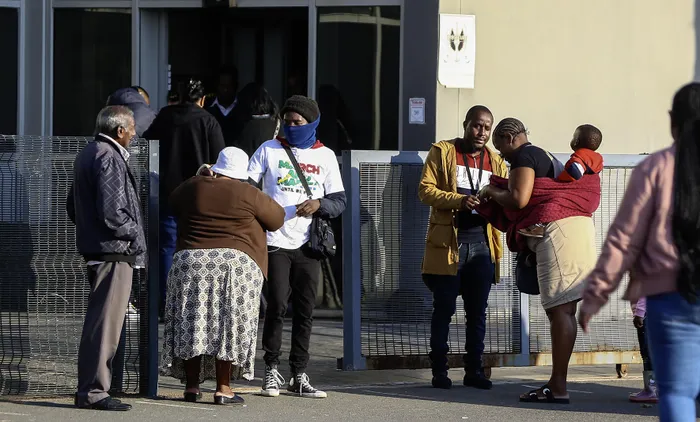Healthcare workers could be colluding with Operation Dudula

With scores of undocumented foreign nationals being turned away at Addington Hospital in Durban and other health facilities in parts of the country, the leader of Operation Dudula, Zandile Dabula, has vowed to continue the movement's anti-foreigner healthcare campaign across the country.
Image: Leon Lestrade / Independent Newspapers.
HEALTHCARE workers allegedly colluding with members of Operation Dudula in preventing healthcare users suspected of being undocumented foreign nationals from accessing healthcare facilities are in violation of the constitution, the National Health Act and the Hippocratic oath they took, says the Health Department.
“We have been alerted of such allegations of collusion between healthcare workers and members of Operation Dudula preventing healthcare users without forms of identification due to suspicion of undocumented foreign nationals, and we call upon anyone with a shred of evidence to share with us so we can act accordingly without fear of favour,” said Health Department spokesperson Foster Mohale.
He said any security guard employed by the department, directly or indirectly, who assists the protesters block healthcare users from accessing facilities, will be charged for overreaching their mandate which is to protect the facilities.
“They would equally face actions for violating the laws and policies of the country. South Africa is not a lawless and xenophobic country, thus we call upon law enforcement agencies to enforce the law against anyone who undermines the laws of our country,” Mohale said.
This comes after a Doctors Without Borders (MSF) assessment to understand the severity of the blocking of non-South Africans from accessing healthcare found some security staff and healthcare staff working in collusion with anti-migrant groups.
The organisation expressed its deep concern over the physical blocking of non-South Africans, including pregnant women, people living with HIV, chronic patients and children - particularly in Gauteng and KwaZulu-Natal.
“For several weeks now, anti-migrant groups have camped outside dozens of clinics and hospitals in Gauteng, preventing non-South Africans from entering public health facilities to seek medical care, irrespective of their legal documentation status,” MSF said.
MSF called for immediate action by the department and relevant provincial departments of health to guarantee the right of access to healthcare for all.
The MSF-launched assessment to understand the severity of these blockages saw their team visit 15 hospitals and clinics in Gauteng, where they witnessed patients being turned away from more than half of these healthcare facilities by groups of between two and 10 people, wearing civilian clothing.
The groups are either stationed at the gate or inside facilities and demand identification from every person who tries to enter, turning away those they deem non-South African. From MSF’s assessment, the issue was more widespread at primary healthcare clinics (PHCs) than hospitals.
“Our team even witnessed two clinics where security staff and healthcare workers worked in collusion with these anti-migrant groups. We urge the Department of Health to immediately address healthcare facilities who are enabling or encouraging any kind of denial of healthcare,” said MSF Southern Africa's Director of Operational Support Unit, Claire Waterhouse.
The MSF team also visited and called nearly 50 patients who indicated that they were denied access to healthcare in 24 healthcare facilities in and around Johannesburg, Durban and Tshwane. The patients consisting primarily of late-term pregnant women and people with diabetes, hypertension and HIV, have expressed fear, panic and confusion.
Most informed MSF that they already struggle financially and are unable to buy medication or afford private medical care.
*Thando, a 33-year-old woman, was turned away on July 14 from a queue inside a hospital in Gauteng by an anti-migrant group for being undocumented. She is a 16-week high-risk pregnant patient who is also hypertensive.
“I already knew of the situation at the hospital when I went because another girl had already told me that foreigners were being turned away. But I still decided to try. So, I got to the hospital early in the morning at 7am. There were about seven to eight people in the queue already”.
A man randomly appeared holding a South African ID card.
“He waved it, walking around and showing us. He said that if any of us didn't have something like what he was holding, or if a passport didn't have a permit, we should start getting out. The nurses were there, and they started laughing, supporting him. They said we don’t pay tax, and they are tired of us. They said we can go; it will be less work for them. Only four people were left inside when the rest of us had to leave,” added Thando.
MSF said South Africans who have lost or forgotten their ID documents, or those they assumed ‘did not look or sound South African’ enough, are also losing access.
*The patient's name has been changed.
Cape Times
Related Topics: